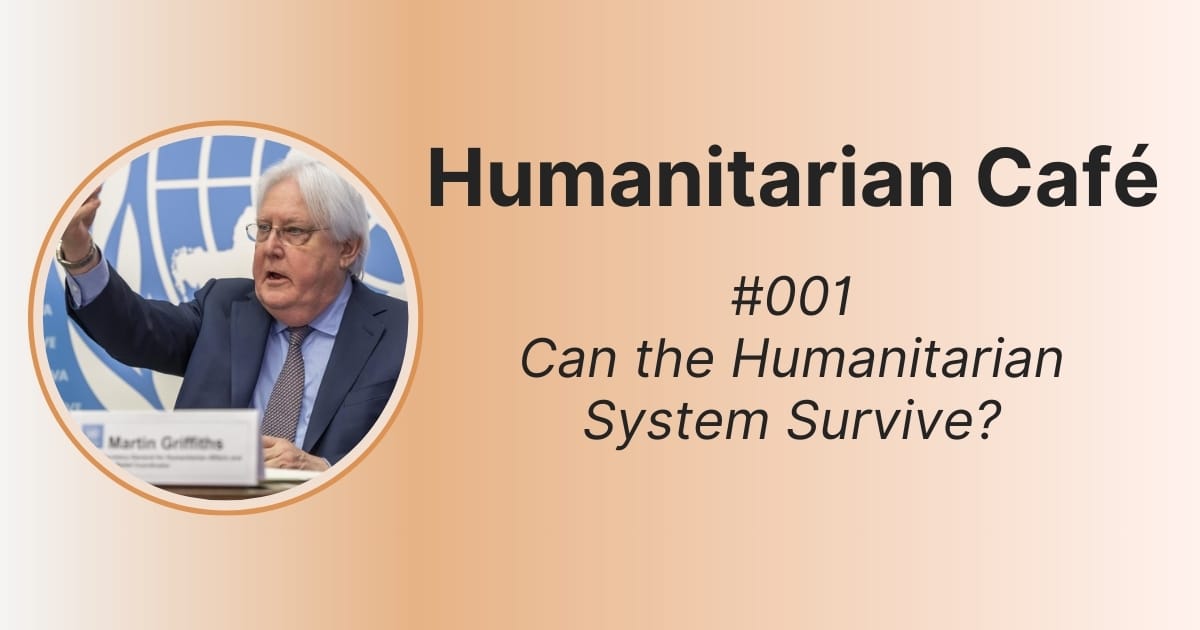- Humanitarian Café
- Posts
- Expert: "The Humanitarian System can Survive"
Expert: "The Humanitarian System can Survive"
Read the reflections of one of the most knowledgeable humanitarians in the world on the future of the sector.

Hello,
Earlier this week, I listened to an interview with Martin Griffiths that gave me many cues to discuss and some concerns for the humanitarian sector.
These concerns were raised immediately from the title: Can the humanitarian system survive?
Usual question, but this time with no clichéd answers.
Well, it will, but it will probably change.
If, for any reason, you don’t know Martin, he served as the Under-Secretary-General for Humanitarian Affairs and Emergency Relief Coordinator until March 2024. Apart from being a diplomat, he has worked in the humanitarian sector for a while.
Let’s start with the answer to the interview's central question. Yes, the humanitarian system can survive and prosper, but it needs changes.
Let’s explore some of them:
Access and Negotiation
First of all, I loved the use of Sudan as an example. In the last two years, the world's attention —and donors' —has been on Ukraine and Gaza/Lebanon. But that’s not the point.
The interesting aspect is the stress on negotiation with all parties and the need to persist on the humanitarian principle that aid must be delivered based on need, not political considerations. He cites the example of Sudan, where both parties don’t let aid in because it will favor the enemy.
He also talks about humanitarian diplomacy and the need for big nations to support and understand humanitarian efforts.
What should we do? Emphasize the need for professional mediation in conflict resolution, as Griffiths notes, the decline in international mediation efforts.
Resource: At the intersection of humanitarian diplomacy and negotiation. (opens in Spotify) the Frontline Negotiatiors podcast episode.
The Role of Local Communities
In our work and planning, we should never forget that first responders are the communities themselves. Earthquakes, floods, conflicts, mass displacements, and humanitarian agencies are never the first to arrive.
Sometimes, the communities go bankrupt to help the displaced arriving in their areas.
My take: And what do we do? We help only the displaced, causing resentment and rejection.
Resource: From solidarity to resistance: host communities’ evolving response to the Rohingya refugees in Bangladesh, Journal of International Humanitarian Action.
Global Attention and Double Standards
Back to the Sudan example.
The disparity in global attention and resources allocated to less-known crises is a significant issue in humanitarian response.
This is no surprise for everyone posted in a forgotten (by donors) crisis.
What can we do? Continued efforts to raise awareness, more scientific and data-driven advocacy, and support policies prioritizing aid based on need rather than political or economic interests.
The UN Appeals
When asked about the current picture of the UN appeals, Martin replied that they had diminished very quickly over the last three years.
And every year is going down.
While it was not unusual for it to be around 50% before, he gives the example of Syria, which is currently at about 18-20%, a percentage that is not that uncommon globally.
To underline: I liked the cynical metaphor of the donors being God and deciding who to prioritize between the people of the world in need of humanitarian assistance.
Conclusion
Yes, the humanitarian sector can survive.
But the current picture is making our work more and more complicated.
Listen to the whole interview on the BBC HARDtalk.
Thanks for reading,
Luca - Humanitarian Café
Did you like this issue? If so, please do me a favor and share it with another humanitarian leader who might be interested.